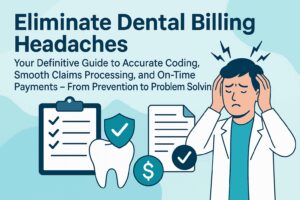
Creating an Effective Strategy to Resolve Clinical and Coding Denials

Table of contents
• Introduction
• Understanding the Impact of Clinical and Coding Denials
• Importance of Developing an Effective Strategy
• Step 1: Ensure Communication and Collaboration
• Step 2: Create a Multidisciplinary Approach
• Step 3: Secure Administrative Support
• Step 4: Challenge Denials
• Step 5: Provide Ongoing Education and Training
• Conclusion
Introduction
Are you tired of dealing with pesky claim denials that are costing your practice money? Well, you’re in luck! In this blog, we will explore how to create an effective strategy to resolve those dreaded clinical and coding denials. Get ready to say goodbye to revenue loss and hello to improved cash flow! But before we dive in, let’s take a moment to understand the impact of these denials and why it’s essential to develop a strategy to combat them. Stay tuned, folks! We’ve got some serious denial-busting tips coming your way. Buckle up!
Understanding the Impact of Clinical and Coding Denials
Do you ever feel like you’re constantly battling with insurance payers over denials and claim rejections? Well, you’re not alone! The struggle is real, my friend. In fact, payers have been ramping up their scrutiny of physician queries, so you need to be extra vigilant. They’re just waiting to pounce on any gaps in your documentation, so don’t give them an opportunity to deny your claims.
But fear not! There is hope. The American Health Information Management Association (AHIMA) has graciously provided guidance on successful query writing. They’ve even shared practice briefs in their Guidelines for Achieving a Compliant Query Practice (2019). So, grab a cup of coffee and get ready to dive into these 5 steps to creating a successful appeal strategy.
Step 1: Ensure communication and collaboration. This one’s a no-brainer. You need to have open lines of communication between coders and clinicians. After all, determining the type of denial requires combined expertise. Clinicians rely on coders for DRG validation, and coders need clinical validation from the clinicians. It’s like a beautiful dance of collaboration, ensuring that your denials are properly documented and clinically supported.
Step 2: Create a multidisciplinary approach that includes senior management. Gather the troops, folks! Get everyone involved, from managed care to legal and compliance. Take a deep dive into those health plan contracts and understand the language inside out. You don’t want to be caught off guard by denials that use tricky terms like “didn’t significantly increase resources.” Be aware of your appeal process rights, my friend.
Step 3: Secure administrative support. Appeal coordinators and administrative assistants are your secret weapons in this battle against denials. Don’t let a denial slip through the cracks just because your process isn’t managed in a timely manner. Trust me, even one high-dollar claim denial can be a major blow to your revenue. So, don’t skim on the administrative support. It’s money well spent.
Step 4: Never assume that a denial is correct. Just because someone in the audit department signed off on it doesn’t mean it’s gospel truth. Look, we all know administrative personnel aren’t always the most knowledgeable when it comes to coding. Make sure to verify all references through trusted resources like the AHA Coding Clinic and the AMA’s “Finding Coding Resources.” Check if the references are applicable to your case and don’t be afraid to question the credibility of denials.
Step 5: Provide ongoing education and training. Knowledge is power, my friend. Educate all the stakeholders involved, from physicians to coders and everyone in between. Keep evaluating your contract language, promote collaboration between CDI and coders, and of course, assess your appeal process. If your strategies aren’t successful, figure out why and make the necessary adjustments.
So there you have it, my battle-hardened warriors. These 5 steps will lay the foundation for an effective appeal strategy. Remember, the shift towards value-based payment is upon us, and we need to be armed with the latest trends in coding denials to fight the good fight. Stay strong, stay informed, and keep those denials at bay!
Importance of Developing an Effective Strategy
Being denied can be a hard pill to swallow. Especially when it comes to medical billing and coding denials. They not only result in severe financial loss but also add on to the burden of processing each rejected claim. So, how can you tackle this never-ending cycle of denials? Well, developing an effective strategy is the answer!
The importance of a good strategy cannot be emphasized enough. It’s like having a superhero cape to ward off those denials and save your revenue from going down the drain. With a robust strategy in place, you can prevent revenue loss, improve cash flow, and reduce the burden of processing rejected claims. Now, who doesn’t want that?
To kickstart your denial-fighting journey, the first step is to ensure communication and collaboration. It’s crucial to have the right players on your team – the coders and clinicians. They need to work together like peanut butter and jelly (minus the calories) to answer critical questions. Is the denial properly documented and clinically supported? Does it meet the coding rules? By holding regular meetings and recruiting a physician advisor or champion, you can raise awareness and keep your team on their toes.
Next up, create a multidisciplinary approach that includes senior management. Get all the bigwigs involved – managed care, revenue cycle, compliance – and pay attention to the language in health plan contracts. Don’t let tricky contractual jargon catch you off guard and leave you scrambling for an appeal. Know your rights and understand the contract language like the back of your hand.
Secure administrative support because even superheroes need sidekicks. Appeal coordinators and administrative assistants play a crucial role in managing the appeal process efficiently. Time is money, and a timely appeal can save you from losing a significant amount. So, don’t underestimate the power of administrative support.
Now, here comes the fun part – challenge denials! Never assume that a denial is correct. Take the denial by its horns and question its credibility. Verify all references, double-check the missing key points, and demand to see the appropriate credentials of the reviewers. After all, you don’t want a denial signed by someone who’s as clueless as a pigeon playing chess.
Last but not least, provide ongoing education and training. Involve all stakeholders in the process, keep an eye on contract language, educate physicians, promote collaboration between CDI and coders, and continuously assess the appeal process. Change is the only constant, and as healthcare shifts towards value-based payment, staying updated and adapting your strategies is vital.
So, there you have it – a roadmap to conquer clinical and coding denials like the superhero of medical billing and coding. Implement these steps, and soon you’ll be on your way to saving the day and your revenue!
Step 1: Ensure Communication and Collaboration
Ah, yes, the magical world of communication and collaboration. It’s like a Disney fairytale come true, where coders and clinicians live happily ever after, working together in perfect harmony. But let’s not get carried away with fantasies. In reality, these two groups often speak different languages. Coders are fluent in coding jargon, while clinicians are more comfortable with medical jargon. It’s like trying to bridge the gap between Shakespearean English and modern slang.
But fear not! There is hope for a happy ending. By fostering collaboration and open communication between coders and clinicians, we can break down those language barriers and build a stronger foundation. How, you ask? Well, here are a few strategies:
Hold regular meetings between coding and CDI staff. This way, coders can learn about the coding specificity required to capture the severity of patients’ conditions. Because let’s face it, medical language doesn’t always equate to coding language. It’s like translating Shakespeare into emojis.
Recruit a physician advisor or champion to raise awareness about these issues and train the medical staff directly. Think of them as the Gandalf of the healthcare world, guiding the way and helping everyone understand the importance of accurate documentation and coding. Plus, they can use their magical powers to bridge the gap between coders and clinicians.
So, what’s the point of all this collaboration and communication? Well, when coding and CDI staff work together, they can answer critical questions like: Is the denial correctly documented and clinically supported? Does it meet the definition of a secondary diagnosis? They can also ensure that documentation reflects the severity of patient conditions for both patient care and proper payment. It’s like building a bridge of understanding that leads to better patient outcomes and, of course, more revenue.
But wait, there’s more! By involving coders and clinicians in the denial resolution process, we can create a culture of collaboration and mutual understanding. It’s like a healthcare version of “The Bachelor,” but without the drama and rose ceremonies. And with everyone working together, we can tackle those pesky denials head-on and show those payers that we mean business.
So, let the collaboration begin! Break out the coffee and donuts, gather around the conference table, and start building that bridge of understanding between coders and clinicians. Because when it comes to resolving clinical and coding denials, teamwork truly does make the dream work.
Step 2: Create a Multidisciplinary Approach
Ah, senior management, the keepers of the kingdom! It’s time to involve these noble beings in our quest to conquer claim denials and ensure a prosperous revenue cycle. Get their buy-in and participation, for the success of our strategy depends on it.
But wait, before we dive into the deep waters of contract language, let’s understand why involving senior management is crucial. Picture this: denial responses flying back and forth, a battle of words and numbers. Wouldn’t it be great to have a team of experts from different departments to join forces and fight these denials together? That’s where our senior management heroes come in.
These brave souls bring their expertise in managed care, revenue cycle, clinical documentation, health information management, utilization review, legal, and compliance to the table. They have the knowledge and power to decipher the complex language of health plan contracts and Medicare and Medicaid agreements. They can uncover those hidden gems, those clauses that could make or break our appeal.
Now, remember the infamous phrase “didn’t significantly increase resources” that denials often use as their weapon of choice? Well, if we know our contract language like the back of our hands, we can challenge that denial with confidence. We can say, “Hey, Mr. Denial, you may think you’ve won this round, but according to section 4.2.1b of our contract, you can’t use that flimsy excuse to deny our claim!”
So, let’s gather our senior management troops, arm ourselves with contract knowledge, and march forward. Together, we will triumph over claim denials and reclaim the lost revenue. Plus, who knows, maybe we’ll even get a fancy parade thrown in as a bonus!
Stay tuned for the next steps in our epic journey to conquer clinical and coding denials. We’re just getting started, my friends!
Step 3: Secure Administrative Support
Appeal coordinators and administrative assistants are the unsung heroes of the appeal process. These individuals play a vital role in ensuring that the appeals are managed in a timely manner, because let’s face it, money is lost when claims are not appealed within the proper time frame. And we all know that losing money is definitely not a fun thing to do.
Just imagine, even one high-dollar claim denial that is not appealed on time could equal an appeal coordinator’s yearly salary. Ouch! That’s like paying for a fancy vacation only to realize that you forgot to pack your swimsuit. Talk about a major disappointment!
But wait, there’s more! With the increasing volume of denials, multiple small-dollar amounts can be equally devastating. It’s like a never-ending rain of denial letters, slowly drowning you in a sea of paperwork and frustration. So, having appeal coordinators and administrative assistants on board is crucial to keep your head above water.
They are the ones who diligently manage the entire appeal process, making sure that all the required documentation is in place, deadlines are met, and communication with the payers is maintained. Without them, the appeal process can quickly turn into a chaotic mess, leaving you stranded on a deserted island with no hope of getting your claims paid.
So, if you want to avoid financial disaster and ensure a smooth sailing appeal process, give a shout-out to your appeal coordinators and administrative assistants. They truly are the secret weapons in your battle against claim denials. And hey, a little appreciation can go a long way. After all, without them, you might as well be appealing to the powers of the Bermuda Triangle. Good luck with that!
Step 4: Challenge Denials
Ah, the joys of dealing with insurance denials. You submit a claim, expecting a smooth process, only to be hit with a denial. It’s like a slap in the face, isn’t it? But fear not, my friend, because we have some handy steps to help you challenge those denials like a pro.
First off, don’t assume that the denial is correct. I mean, who are these administrative personnel or staff in the audit department to deny your claim? It’s time to question their credibility. Ask yourself, do they really know what they’re talking about? Are they certified coders or clinical experts? If not, it’s time to bring in the big guns.
Verify all references through trusted resources like the AHA Coding Clinic and the AMA’s “Finding Coding Resources.” You’d be surprised how many key points go missing in those denials. And hey, if those references don’t apply to your case, don’t be afraid to point it out in your appeals. Show them that you’re not messing around.
Oh, and let’s not forget about the reviewers themselves. If the denials aren’t signed by clinicians or certified coders, well, that’s a red flag right there. So, go ahead and politely request the appropriate credentials of the reviewers. Let’s make sure the right people are making those denial decisions, shall we?
So, my friend, armed with these steps, you can challenge those denials with confidence. Show the insurance companies that you won’t back down. You’re not just a dental practice to be trifled with. No, you’re a force to be reckoned with. They better be prepared for a fight, because you’re not giving up that easily.
Remember, the key here is to question, verify, and demand credentials. It may take some extra effort, but it’s worth it in the end. So go forth, my denial-challenging warrior, and claim what is rightfully yours. Show those insurance companies who’s boss!
Step 5: Provide Ongoing Education and Training
Alright, folks, now that we’ve covered the importance of communication, collaboration, involvement of senior management, and securing administrative support, let’s move on to the final step – providing ongoing education and training. Because let’s face it, in order to tackle clinical and coding denials like a pro, you need to stay updated and keep everyone on the same page. So, grab your notepads and let’s dive right in!
Involving all stakeholders: It’s time to gather the troops and make sure everyone is on board. From coders and CDI staff to physicians, it’s important to involve all the key players. After all, a team effort is what will lead to success. So, organize training sessions, workshops, or even webinars to keep everyone abreast of the latest coding guidelines, documentation requirements, and any changes in the denial landscape. And remember, folks, sharing is caring!
Evaluating contract language: Now, I know contract language might not be the most thrilling topic of conversation, but trust me, it’s crucial. Take the time to review your contracts with health plans, Medicare, and Medicaid. Look for any tricky language that can be used as a loophole for denials. If you spot any vague phrases like “didn’t significantly increase resources,” make sure to put on your detective hat and cross-examine that contract. You need to know your appeal process rights, my friends, and be prepared to challenge those denials.
Educating physicians: Ah, the physicians, the superheroes of the healthcare world. But even superheroes need a little guidance sometimes. Provide your medical staff with educational resources and training to ensure they understand the importance of accurate and detailed documentation. Help them bridge the gap between medical language and coding language, so the severity of patient conditions is properly captured. Remember, folks, a well-documented case means proper payment and better patient care. It’s a win-win situation!
Promoting CDI and coder collaboration: Teamwork makes the dream work, my friends. Encourage collaboration between your CDI (Clinical Documentation Improvement) specialists and coders. Set up regular meetings where they can share insights, challenges, and coding specificity required to capture the severity of patients’ conditions. And hey, why not recruit a physician advisor or champion to raise awareness about these critical issues? The more, the merrier!
Assessing the appeal process: Last but not least, my dear content warriors, it’s time for some self-reflection. Take a step back and evaluate your appeal process. Is it effective? Are you achieving the desired results? If not, it’s time to put on your detective hat once again and figure out why. Make the necessary adjustments, tweak your strategies, and keep evolving. Remember, my friends, healthcare is constantly evolving, and so should your approach to resolving denials.
So there you have it, folks! The five steps to creating an effective strategy to address clinical and coding denials. By ensuring communication and collaboration, involving all stakeholders, evaluating contract language, securing administrative support, and providing ongoing education and training, you’ll be well-equipped to tackle those denials head-on. Stay resilient, stay informed, and keep fighting the good fight!
Conclusion
Denials, be gone! With a well-executed strategy and a dash of determination, you can conquer clinical and coding denials and ensure a healthy revenue cycle for your practice. So, gather your team, sharpen your pencils, and get ready to fight back against those denials with a vengeance. Together, we can make denials a thing of the past and enjoy a prosperous future for your practice. Stay strong, my denial-fighting superheroes!
At One Dental Billing, we have a team of dental billing and coding experts who understand the nuances of dental billing and reimbursement. Our team works closely with your practice to understand your billing requirements, identify areas of improvement and implement solutions that streamline your billing process. To optimize your collections and streamline your billing process, outsource your A/R management to One Dental Billing.
As an experienced outsourcing partner, One Dental Billing delivers streamlined A/R management services with rapid turn-around times and maximum revenue recovery. By leveraging cutting-edge technology and proven industry expertise, they can help you to collect more money, faster than ever before.
Contact Us
Phone: 908-357-1515
111 Town Square Pl, Suite 1203 Jersey City, NJ 07310












